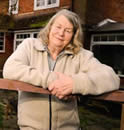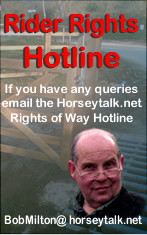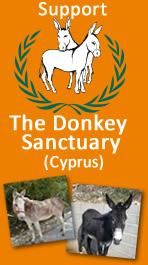
Horseytalk.net/Hoofbeat EXCLUSIVE
NATURAL ENGLAND
New plans to simplify recording rights of way
 New proposals to modernise the process of recording rights of way, developed in consultation with the BHS and groups such as the Ramblers and Country Land and Business Association, have been unveiled by Environment Minister Richard Benyon.
New proposals to modernise the process of recording rights of way, developed in consultation with the BHS and groups such as the Ramblers and Country Land and Business Association, have been unveiled by Environment Minister Richard Benyon.
Plans are expected to cut the time taken to record a right of way by as much as several years, so that routes set to be lost in 2026 can be preserved.
All unrecorded footpaths and bridleways created before 1949 cannot be recorded after 1 January 2026. This ‘cut off’ date by which to claim these historical rights of way was set in the Countryside and Rights of Way Act 2000.
As well as making it easier for walkers, horse riders and cyclists to protect unrecorded rights of way, the proposed system is expected to save almost £20 million a year by cutting needless bureaucracy.
No changes are being made to the protections for rights of way; rather proposals have been made to make the process of recording or changing them more efficient.
Landowners’ applications to move a right of way will continue to be approved only if they do not affect the public’s enjoyment of it, in which case it will be more straightforward for landowners to see them through.
Under logical new plans, paths and trails that are used by the public will be easier to protect, whilst redundant routes and unsubstantiated rights of way claims will be prevented from getting in the way of farming and business interests.
Environment Minister, Richard Benyon said:
"Footpaths, bridleways and trails are the life-blood for many rural communities, providing access to our world-renowned landscapes. Our changes will help protect access for the thousands of people who walk, ride and cycle in the countryside every week. "
"Protecting and improving access to the countryside is the latest in a programme of Government measures to grow the rural economy."
"These routes have huge benefits to the health and wellbeing of those that use them and can help stimulate the local economy, bringing in more visitors to enjoy rural areas."
A £2 million grant fund has opened for applications from local communities today to improve access to rural areas in ways that will grow the regional economy.
The Paths for Communities initiative is part of the Government’s £165 million Rural Economy Growth Review announced in November 2011. Local volunteer groups are invited to bid for funding to create new rights of way or increase the accessibility of existing ones. This may include making rights of way accessible for horses and bikes, improving way marking, creating maps and making better links with local transport services and tourist destinations.
The proposals in the rights of way consultation are based on recommendations from a Stakeholder Working Group, which issued the following statement today:
"We welcome this consultation package, which builds on the Stakeholder Working Group recommendations, and are keen to continue to work constructively with the Government throughout the consultation and implementation process".
Improvements
to the policy and legal framework for public rights of way’ is online
at http://www.defra.gov.uk/consult/2012/05/14/improve-rights-of-way/
The
consultation closes on 6 August 2012.
The maps will never be up to date unless the processes are simplified and streamlined
Says the OPEN SPACES SOCIETY
 The Open Spaces Society is pleased that Defra is launching a public
consultation about plans to make it easier to get England's official map of
public paths up to date.
The Open Spaces Society is pleased that Defra is launching a public
consultation about plans to make it easier to get England's official map of
public paths up to date.
The 'definitive' maps of rights of way are lamentably incomplete. There are many public footpaths, bridleways and byways which are highways in law but are not shown on the map and are thus hidden and secret. The process for putting them on the map can be long and tortuous, and much of the work falls on the surveying authorities (county and unitary councils).
The Countryside and Rights of Way Act 2000 introduced a cut-off date of 1 January 2026 for the claim of many ancient highways and ministers promised funding to ensure the maps could be brought up to date before the cut off. Half that period has now elapsed yet no progress has been made and the backlogs of path claims are increasing.
A working party of wide interests, convened by Natural England, made recommendations to ministers in March 2010 (Stepping Forward) and, two years later, the environment minister Richard Benyon is consulting the public on the working party's agreed package.
The consultation proposes that the cut-off date should be implemented only if the whole package of measures is introduced. This speeds up and simplifies the process for claiming paths and determining whether they should be added to the map.
Says Kate Ashbrook, general secretary of the Open Spaces Society, a member of the working group: 'We are pleased that the environment minister has at last launched the public consultation, the first stage to getting our recommendations enshrined in law. The maps will never be up to date unless the processes are simplified and streamlined. This of course chimes with government's wish to reduce red tape.
"In the 12 years since the 2026 cut-off was introduced in law, local authorities' backlogs of path claims have increased, not least due to budget cuts. To take two random examples, Staffordshire County Council has a 17-year backlog, and Gloucestershire has a ten-year backlog, and these are set to increase.
'The effect of all this is that there are countless highways which we have the right to use and enjoy but, because they are unrecorded, are at risk of being built over and incorporated into development-after which it is almost impossible to save them. Many have already been lost.
'It is unusual for so many organisations with different interests to become bedfellows, but the government's consultation proposals are backed by the Open Spaces Society, British Horse Society and Ramblers, as well as the Country Land and Business Association, National Farmers' Union and local authorities and other organisations.
'So we hope there will be widespread support for the plans so that legislation to speed up the claims process can be introduced in the third session of this parliament. The year 2026 will soon be upon us,' warns Kate.
"There is much that could be achieved without waiting for more consultation."
Says Maureen Comber
 The statement from Richard Benyon that -
"Protecting and improving access to the countryside is the latest in a
programme of Government measures to grow the rural economy. These routes
have huge benefits to the health and wellbeing of those that use them and
can help stimulate the local economy, bringing in more visitors to enjoy
rural areas." -
The statement from Richard Benyon that -
"Protecting and improving access to the countryside is the latest in a
programme of Government measures to grow the rural economy. These routes
have huge benefits to the health and wellbeing of those that use them and
can help stimulate the local economy, bringing in more visitors to enjoy
rural areas." -
Is most welcome and I congratulate him for recognizing the desperate need to address an issue which for some of us has taken a lifetime of lobbying successive governments to address, in particular, the case for horse riders. They of all the User Groups have been badly discriminated against over the years. Disgracefully under the last government 'open access' provided in excess of £90,000,000 worth of benefit to walkers only and Sustrans has been similarly funded for cycle tracks. Meanwhile horse riders have been disenfranchised on the country lanes because of the dominance of motor vehicles and the fragmented bridleway network and advised to seek co-operation from landowners. That advice has wrought nothing in terms of additional bridleways or even basic safety measures on the minor county lanes.
I shall be suggesting that the Coalition might consider re-visiting the grading of RUPPS to BOATS or vice versa since many of the byways in Hampshire have been wrongly upgraded from RUPP (road used as a public path) to BOAT during the 1980's directive from central government under the Wildlife & Countryside Act. I can say this with certainty having looked at the Highway Committee minutes of that time and seen that the upgrade was done on the mere finding of wheel marks on the track. This was against the advice from DEFRA (attached) that this could not be, and that 20 years use by motor vehicles before 1930 was needed for the upgrade to be verified.
This would save many of our ancient lanes from the continual abuse by motor vehicles which deprives the intended principal non-motorised group of users from the use and enjoyment of them.
Also a closer look should be taken at Local Authorities who take care to tick all the right boxes but then do not act accordingly when it comes to improving access to the countryside. As an example Hampshire County Council acted against public opinion, local parish councils, the local commoners and the law when they removed 80 acres of common land from the Register of Common Land for which they are the Registration Authority, without application to the Secretary of State. This is a criminal offence.
It is settled law that no rights can be obtained from illegal acts which were unlawful in the first place and yet Hampshire County Council have for years kept horse riders from accessing their customary rights of access to Broxhead Common on the pretext that their lease of the rest of the common does not include access by horse riders. That lease appears to be an irrelevant out of court settlement with the landowner and therefore fraudulent as well as unlawful.
There is much that could be achieved without waiting for more consultation.
The CLA and NFU, however, do not agree:








